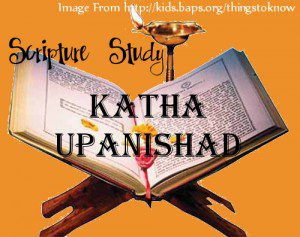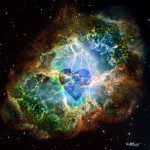We are doing a scripture study together: reading along through some scriptures and discussing the passages. Today is the fourth post of my favorite Upanishad: The Katha. This is the story of a boy who chatted with the God of death.
Part Two http://www.angelfire.com/electronic/awakening101/upani_katha.html
10
Yama said: I know that the treasure resulting from action is not eternal; for what is eternal cannot be obtained by the non—eternal. Yet I have performed the Nachiketa sacrifice with the help of non—eternal things and attained this position which is only relatively eternal.
11
The fulfilment of desires, the foundation of the universe, the rewards of sacrifices, the shore where there is no fear, that which adorable and great, the wide abode and the goal—all this you have seen; and being wise, you have with firm resolve discarded everything.
12
The wise man who, by means of concentration on the Self, realises that ancient, effulgent One, who is hard to be seen, unmanifest, hidden and who dwells in the buddhi and rests in the body—he, indeed, leaves joy and sorrow far behind.
13
The mortal who has heard this and comprehended it well, who has separated that Atman, the very soul of dharma, from all physical objects and has realised the subtle essence, rejoices because he has obtained that which is the cause of rejoicing. The Abode of Brahman, I believe, is open for Nachiketa.
14
Nachiketa said: That which you see as other than righteousness and unrighteousness, other than all this cause and effect, other than what has been and what is to be—tell me That.
15
Yama said: The goal which all the Vedas declare, which all austerities aim at and which men desire when they lead the life of continence, I will tell you briefly: it is Om.
16
This syllable Om is indeed Brahman. This syllable is the Highest. Whosoever knows this syllable obtains all that he desires.
17
This is the best support; this is the highest support. Whosoever knows this support is adored in the world of Brahma.
18
The knowing Self is not born; It does not die. It has not sprung from anything; nothing has sprung from It. Birthless, eternal, everlasting and ancient, It is not killed when the body is killed.
19
If the killer thinks he kills and if the killed man thinks he is killed, neither of these apprehends aright. The Self kills not, nor is It killed.
20
Atman, smaller than the small, greater than the great, is hidden in the hearts of all living creatures. A man who is free from desires beholds the majesty of the Self through tranquillity of the senses and the mind and becomes free from grief.
21
Though sitting still, It travels far; though lying down, It goes everywhere. Who but myself can know that luminous Atman who rejoices and rejoices not?
22
The wise man, having realised Atman as dwelling within impermanent bodies but Itself bodiless, vast and all—pervading, does not grieve.
23
This Atman cannot be attained by the study of the Vedas, or by intelligence, or by much hearing of sacred books. It is attained by him alone whom It chooses. To such a one Atman reveals Its own form.
24
He who has not first turn away from wickedness, who is not tranquil and subdued and whose mind is not at peace, cannot attain Atman. It is realised only through the Knowledge of Reality.
25
Who, then, knows where He is—He to whom Brahmins and kshattriyas are mere food and death itself a condiment?
Chapter-II http://www.vedarahasya.net/katha-2.htm
“I know that the wealth saved and protected is illusory. One cannot attain the ever-existent, permanent wealth of Self-Knowledge through and by the use of temporary, illusory objects that you see in the daily life of the materialistic world. Still, I have taught you the technique of Naciketa-agni which can be performed with the worldly objects and which can take you to the ultimate knowledge path. Since I have done this, I will also be eligible for being in this position (of Yama and also of the knowledgeable one) for infinite years to come.”
“O Naciketas! Thou hath attained this state of Knowledge which is at the end border of the satiation of all desires, the reside of the whole world, the end-result of all deeds, the place of no fear in which everything else is centered, that which is praised by all, the limitless one, the all-pervading and the one which is the life of the life (breath) through sheer will power and strong mind! O the Brave one! You have crossed all those things that are of illusory nature.”
“The brave one who, by continuous practice of meditation on the self, identifies and understands the Self (the classic, bright force of power) which is hard to be seen but that which is present within all things, which is the hidden thing and remains in the brain-cave of every being and the oldest of all things, he immediately leaves behind himself all sorts of happiness as well as sorrows. He remains unaffected by either of these.”
“The man who has understood it as it is and who has segregated the root of dharma using his intelligence and sense and having attained the smallest atom of the Atma will obtain that which is deeply enjoyable and remains ever-joyous. I think the house of salvation is kept open for thou, O Naciketas”.
Naciketas: “That thing which you see as beyond both Dharma and Adharma, and that which is beyond activity and cause, and that which is beyond the produced and the one to be produced, kindly tell me about that”.
Yama: “That is the one which is praised by all the Vedas; the same is the object of end-result of all penances; desire of attaining the same is the reason for practice of celibacy. I shall tell you that thing in short. It is the syllable ‘OM’ (also written as AUM).”
“This syllable (OM) is the (lower aspect of) Brahman; this is the highest aspects of Brahman as well. If one understands this, he gets all his desires fulfilled. Whatever he desires for becomes his immediately.”
“This support is the best; this support is the highest as well. The one who understands this support becomes the blessed one in the Brahma Loka.”
“One who has understood this truth beyond doubt – he is not born again; nor does he die. This Atma is not given birth to or produced by something. Nothing else is produced from this Atma also. This (the Atma) is birth less, ever existent and immortal. It precedes everything else and it is not destroyed even when the physical body (where it resides) is destroyed.”
“A killer, who thinks that he has killed (the Atma) and the killed, who thinks that he (the Atma) has been killed are both wrong. Both of them do not understand the Atma. This (Atma) does not kill nor can it be killed.”
“This Atma, which is smaller than the smallest atom and which is larger than the largest one, resides in the heart of the Jivan. That one who has completely renounced his desires, he can see the Atma. (Having thus relinquished his desires,) he understands the greatness of the Atma through the clarity of the mind and an attitude that is not stained by sorrows.”
“Sitting at just one place, it (the Atma) travels long; laying down at a place, it goes everywhere. Who else can understand that Supreme Soul, which resides in me in the forms of both pleasure and sorrow except me (since it is inside me that it resides)?”
“The wise one who understands the Atma, which resides in the bodies without a body and which is a stable thing residing in instable forms and which is very large and all pervading, as himself (the feeling of: ‘I am He’) does not get affected by any sorrow.”
“This Atma cannot be attained (or understood) by an aspirant simply by learning the Vedas or by brilliant brain or by elaborate questioning sessions or debates. It is only when the aspirant mediates exclusively on the Atma (by the Atma), it is attainable by him. Then the Atma illumines its true form to him.”
“That one who has not come out of his bad habits, the one who has no control over his sense organs, the one who is not able to control and direct his mind in attaining peace – all of these cannot attain the Atma just by reason of possessing greater knowledge or awareness.”
“The Atma to which the four kinds of people (viz the Brahmanas, the Kshatriyas, the Vysyas and the Sudras) are like basic food and to which me, the Yama (the one who has the entire world as his basic food) is like a pickle – who can understand what it is in reality?”
Commentary (Swami Krishnananda)
There is a transition of instruction between the lower and the higher, vaishvanara–agniand hiranyagarbha. “I know that all the treasures of the world are perishable, and that the perishable cannot be a means to the imperishable. Yet, as a candidate of the celestial realm, I performed the vaishvanara sacrifice. I have reached the everlasting by impermanent means.”
This is a difficult mantra to understand, and various commentators have different opinions about it. Some think it is spoken by Yama; some others, by Nachiketas. There is no ‘uvacha’ in the Upanishad like in the Bhagavadgita. However, it cannot be Nachiketas saying it for at least one reason. The speaker says, ‘I have performed thenachiketas-agni’, so they must be Yama’s words. Because Nachiketas has only heard about it but has not yet performed it.
Anandagiri’s comment, which has been accepted by many, says that this is the teaching of Yama to Nachiketas, revealing the former’s own personal condition. “Do you know how I have become Yama, the Lord of Death? It is by performing the vaishvanara–agni. I know it does not by itself lead to the absolute Truth. It is anitya and through it one cannot reach the nitya.” This means that nothing of this world can lead you to the imperishable; even the higher realms are, like this world, for the senses even though objects come closer in these higher realms because of their subtlety. The residents ofbrahma-loka do not have a physical or even subtle body, but have only a causal one, merely one step below the Absolute where it makes no difference as to where things are; everything is everywhere. But there is something higher than these levels: the subject of the third boon, which Yama refuses to teach.
All desires are due to a sense of separation from the beloved object. The longing to unite oneself with that from which one is separated is desire. The urge to come together is desire. So, when you come into union with an object, you seem to be in a state of fulfillment. But, says the Upanishad, this is not really fulfilling wants, because they rise again, like a creditor coming again and again until his dues are cleared. If they had really been fulfilled, why should desires rise again? They are not satisfied with what you give, because in a so-called enjoyment, you do not unite. The whole world cannot make you happy because you never can come into union with it, and because you fail in this, you take another birth. Yet, you do not learn the lesson. Your understanding cannot arise, precisely due to the desires. Satisfaction comes only in the ocean of hiranyagarbha. Here, you reach a state of perpetual balance. You do not stand opposed to the object of desire, as you do now. You are able to move freely into the very soul of it. There is no isolation of subject-object, and hence there is perpetual happiness.
The chant of Om is in itself a great sadhana. It puts the whole system into spiritual balance. “This is the supreme mantra,” says Yama, “the supreme Brahman, akshara.”Akshara means a letter, a word, a phrase. It also means imperishable. So it is all this. If at all you can reach Brahman by any means, it is by Om. It is the Supreme, beyond which there is nothing.
This is a very famous, often quoted verse: “Not by speech can He be known; not by the intellect, not even by hearing.” Speech returns baffled. Who expresses speech? The Atman! Who can express the Atman? Even rationality, His partial expression through the buddhi which is a modification of prakriti, cannot express Him. Frail is the intellect when it tries to stretch itself beyond its limits. As a person who cuts the branch on which he sits will fall down, he who tries to know the Atman through the intellect will break. All the faculties of the human mind break down when they try to turn towards the Atman. “He is known only by him whom He chooses.” If God chooses, you may know; otherwise not. This is the interpretation of the Bhakti School. It is God’s grace that He gives youdarshan. By a miracle taking place, you can see God; not by ordinary effort.
But Sankara’s interpretation is unique: It is not that someone chooses, because, for Sankara, that someone does not exist to choose. His understanding of this part of the mantra is: “He is beheld only by That which is the seeker himself.” That which you behold is within yourself, is the meaning. Who is the seeker? Is he outside the Atman? God is the prompter even behind the seeker. Sadhana is not possible without Him. Rather than from without, the choice has to come from within. The seeker and the sought are one.
My Thoughts
These lines are, without a doubt, my favorite in the world:
The knowing Self is not born; It does not die. It has not sprung from anything; nothing has sprung from It. Birthless, eternal, everlasting and ancient, It is not killed when the body is killed.
If the killer thinks he kills and if the killed man thinks he is killed, neither of these apprehends aright. The Self kills not, nor is It killed.
The similarity here with the message of the Gita is pretty stunning. This, it seems to me, is a consistent teaching in Hinduism.
Another great line is: “The wise man, having realised Atman as dwelling within impermanent bodies but Itself bodiless, vast and all—pervading, does not grieve.”
It is certainly most difficult to wrap our minds around how the Atman can be both permanent and part of an impermanent body. That might be why we need more than our minds to comprehend Truth fully, as the next sentence suggests.












